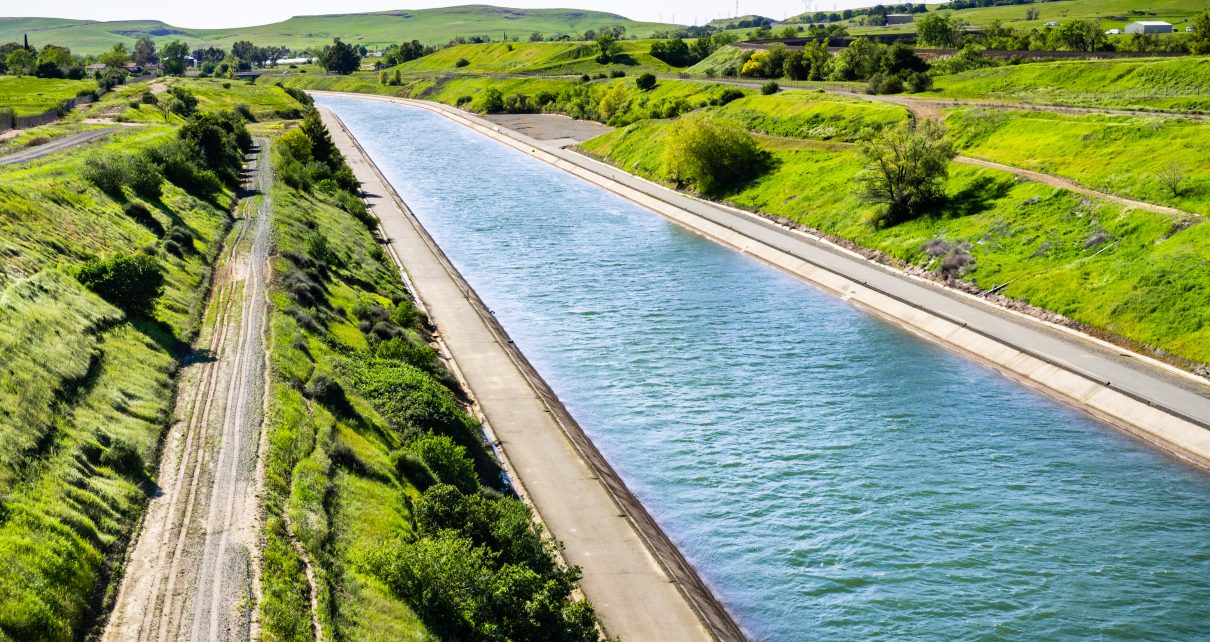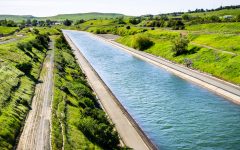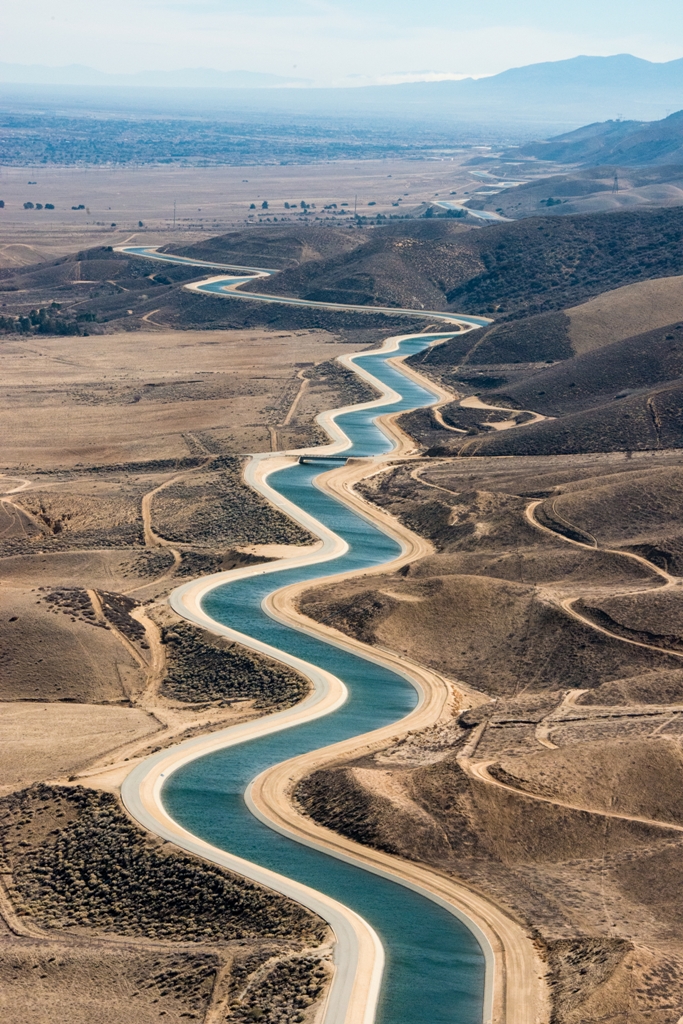
The Thermalito Power Canal in Oroville, Butte County. (Photo: Sundry Photography/Shutterstock)
Bad Water Legislation Could Upend California’s Economy, Domestic Food Supply
Water rights are property rights
By Don Wright, June 11, 2023 2:45 am
If the legislation coming out of Sacramento were graded on the criteria of harmful, unintended consequences, it would receive an “F” average – provided you believe harmful is bad for the citizens and not just the cost of doing government. That can be a big problem when elected officials attempt to shirk the responsibility of governing by handing off major decisions to unelected and largely unaccountable bureaucrats and appointed padishahs. This is not meant to disparage state employees, most of whom go to work to do their jobs and support their families. They have to deal with public unions, conflicting regulatory directives and budget shortfalls.
Three Bills
There are three bills making their way through the legislative process in Sacramento that would upend California’s economy, domestic food supply and the relation between those who govern and those who are governed by handing water rights over to the State Water Resources Control Board. This five member board is appointed by the governor and has a great deal of power already in times of dry and normal years to withhold diversions of water from those with legitimate claims.
Water rights are property rights. The State Board’s mission is to administer water rights but these pending bills would give it far more board powers. There are more than 40,000 active water right claims in California and 80-percent are held by public water agencies. These agencies bring water to our homes, farms and wildlife refuges.
The consequences of these bills are so severe a coalition of more than 100 (and growing) entities and organizations has formed to oppose them. ACWA, the Association of California Water Agencies, the California Chamber of Commerce, and the California Farm Bureau Federation have joined with labor, manufacturing, municipalities and others are lobbying to stop these proposed pieces of legislation from becoming law. It is a joining of forces from diverse interests, geographically statewide not usually given to working together. All of the authors represent upscale, urban districts that would be largely unimpacted by the legislation.
Much of the information following comes from the coalition’s position papers.
AB 460
AB 460 by Assemblywoman Rebecca Bauer-Kahan (D-Orinda) 16th District. Bauer-Kahan Chair’s the Assembly Water, Parks & Wildlife Committee. As written, AB 460 deprives diverters of due process when the State Water Board makes certain findings. The bill would also allow an interim relief order to remain in place for 180 days – 180 days (or 6 months) is an entire irrigation season. This means that a diverter has no real opportunity to defend themselves for an entire 6-month period, and in the meantime, their right to divert water has been suspended and their crops die.
AB 460 would allow interested parties who disagree with dam releases to seek immediate state intervention and authorize the State Water Board to essentially take over dam operations, potentially at a moment’s notice. There are more than enough Non-Governmental Organizations/law firms ready to plead for no diversions beyond just environmental needs and that would be all the water available. More concerning is the State Water Board could immediately issue an interim relief order before holding a hearing if it makes certain findings.
This bill would have the State Water Board serve as prosecutor, judge, jury, and executioner in deciding whether an interim relief order is warranted. This is critical considering that a diverter’s rights to water are at stake without sufficient time to prepare a real case in defense. The right to present evidence and testimony, to cross examine witnesses and to test evidence against you is a fundamental civil right that must be guaranteed before the state may restrict the use of vested property rights, including water rights.
AB 1337
AB 1337 by Assemblywoman Buffy Wicks (D-Oakland), 14th District, would overhaul how California has managed and delivered water for more than a century. The bill’s vision for future water management is little more than handing the State Water Board unfettered authority to control water use as it sees fit.
This bill would authorize the State Water Board to adopt sweeping, and permanent, regulations. Neither the proponents nor opponents of this bill know what regulations the State Water Board would adopt in accordance with the bill. The rulemaking authority that would be afforded to the State Water Board is almost entirely without guardrails.
AB 1337 would exempt all regulations and orders issued in accordance with the bill or Water Code Section 1058.5, (which allows the State Water Board to adopt emergency regulations during extreme droughts) from the California Environmental Quality Act (CEQA). This would be extremely problematic, as it would authorize the State Water Board to ignore impacts within the service areas of a water supplier and exacerbating undesirable consequences.
The State Board’s limited curtailment authority should remain reserved for emergency drought conditions in order to ensure that this tool is used judiciously and effectively. By limiting curtailment to the most severe and urgent water shortages, the State Water Board can ensure that this tool is used only when necessary and that its impacts are carefully managed.
In contrast, AB 1337 proposes the State Water Board use curtailment to manage all water right allocations, within all watersheds, in any water year. There is nothing in the bill that prevents the State Water Board from issuing curtailments even in a wet year like California is currently experiencing, where there is more than enough water in watersheds throughout the state to satisfy all water rights. This would be an unnecessary task for the State Water Board and threaten to create chaos in the way water is managed, diverted, and used.
The coalition warns the consequences of AB 1337 should not be considered lightly. This bill threatens to remake the way water rights are managed in California by employing a top-down approach that would override decades of successful collaborative water management practices.
SB 386
SB 386 by State Senator Ben Allen (D-Santa Monica), 24th District. Allen chairs the State Senate Environmental Quality Committee and his official bio credits him with being the driving force behind converting the state’s transportation to 90-percent electric by 2035.
The consequences of SB 389 should be of interest to all water right holders. SB 389 could undermine the reliability of any water right, and, in turn, interests that depend on these rights. The bill would authorize the State Water Board to drag any water rights holder before the Board to defend its claim of right.
It empowers the State Water Board to initiate an adjudication on its own motion without providing a real basis for its decision to investigate a water right. Once an investigation begins, there are minimal due process protections for the water right holder and the burden of proof rests on the water right holder. State Water Board is the judge, jury and executioner.
This bill is not designed to create a fair and transparent process, nor is it narrowly tailored to investigate dubious claims to right. The risk with this bill is its potential to strip public agencies of water rights that have been used to sustain communities for decades. For more information about the coalition and ACWA’s efforts to oppose this legislation click here.
Unintended Consequences
The coalition has identified four likely results of harm should these bills pass. There are probably several more like – try to get a loan without some assurance your property will have access to a secure water right.
The first consequence the coalition looks at is housing. There is a massive homelessness problem and affordable housing is tough to come by in California. Undermining California’s water rights system could lead to less housing by reducing the amount of water available for new construction.
Housing developers must receive government approval that water agencies will have water available to reliably service new developments. California’s water rights system ensures flexible water management, which allows water agencies to service new demands.
Reductions in water supply will cause developers to spend more on water infrastructure, such as treatment and distribution systems, to meet the needs of new housing construction. These higher costs reduce housing affordability. It is essential to continue to support California’s water rights system to ensure that there is sufficient water available to support new housing production.
The second problem will be infrastructure investments. Water agencies rely on the certainty of water rights when investing in water supply infrastructure. The creditworthiness of water agencies may decrease when water rights become uncertain or unreliable. This decrease can translate into higher interest rates on financing for water supply infrastructure. These higher interest rates mean more expensive projects. As costs climb, projects may be delayed or canceled, which impedes the ability of water agencies to provide reliable water supplies.
Uncertainty created by the loss of reliability in water rights can discourage private sector investment in water infrastructure, leaving water supply projects underfunded. Water agencies are making generational infrastructure investments to ensure a reliable water future in a changing climate. To ensure that water agencies have the necessary funding to invest in infrastructure and provide reliable water supply to their customers, it is crucial to maintain the reliability of water rights and to continue to support water supply infrastructure investment.
Jobs are at stake. Undermining water supply reliability means fewer infrastructure and housing construction jobs because these industries are dependent on reliable water supply. This can result in fewer job opportunities for workers in the construction and maintenance industries, as well as in other industries that rely on water, such as agriculture and manufacturing.
As if we didn’t have enough problems retaining employers a lack of water supply reliability will discourage businesses from relocating or expanding in California. This could lead to a reduction in job opportunities across various industries, ultimately resulting in a negative impact on the state’s economy.
The cost of water will go up if these bills pass. Water rights instability makes it more expensive to invest in projects and purchase water through transfers, which would lead to higher water rates for Californians. Water agencies are on the front lines of building a 21st century infrastructure for a 21st century climate. About 90 percent of investments in water infrastructure come from water agencies. Legislation that places additional cost pressures on water agencies makes it more difficult to respond to climate change and ensure water affordability for Californians.
Who Will Be In Charge?
If these bills pass and the courts and hearings and other current private property protections are removed from water rights the power given the State Board will be unprecedented. The State Water Resources Control Board is made up of five seats, each filled by appointment by the Governor. But the structure of the State Board has an Executive Officer, who vets much of what appears before the board.
All of the above mentioned interim relief orders, curtailment findings and water rights claims will go through the Executive Officer for review before they reach the Board members. Currently the State Board’s Executive Officer is Eileen Sobeck. For a look at her priorities click here.
“There could not be a more critical challenge facing us at this time than the challenge of achieving racial equity. This moment requires us to respond and implement recommended changes to ensure Water Boards policies and programs are equitable and just,” said Eileen Sobeck, State Water Board Executive Director.
It’s fair to ask if a radical environmental group or so called racial “justice” groups, many who have stated anti-water rights positions were to act as interested parties in requesting curtailments will receive the same response as farmers and cities depending on water. For a look at some NGOs’ priorities click here.
In 2022 the State Board issued a curtailment on the Shasta River of 100 cubic feet per second that was very difficult for growers and ranchers in the area but they complied. They also asked the State Board for some relief but were told in July the curtailment would be zero for the rest of the season. By mid-August the situation on the ground was dangerous with the possibility of livestock dying and shortages of water for fire suppression.
The Shasta River Water Association opted to violate the State Board’s orders and on August 17th it began pumping water from the river to fill stock ponds, try and save what crops they could and store water for fire fighting
. The cubic feet per second flow in the Shasta River dropped from 42 cfs to 18 cfs. The pumping continued for seven days until August 24th when the river’s flow dropped to a low of 14 cfs. They stopped pumping and by the early hours of August 25th the Shasta River was flowing at 50 cfs, more than when the pumping started. This was mid-summer and there were no salmon runs taking place. Was there any environmental damage? The people along the Shasta River decided it was better to pay a fine than lose their livelihood, have animals die and nothing to fight fire with should there be one. A tribe said fish downstream were stranded on the banks by the rapid decrease of flows, though no proof was given.
This incident has been referred to multiple times as a reason to change the State Board’s authority and therefore in the spirit of let’s use an axe instead of a scalpel, the above legislation has been written in response.
If you belong to an organization and believe this is bad legislation contact ACWA to lend support to the coalition. If you’re an individual who believes this is bad legislation contact your state Senator and Assemblyman and let them know your feelings. You can make a difference. It’s water rights today, what will it be tomorrow if they are successful?
- Maddy Institute & California Water Institute FSU, Water Conference - September 7, 2024
- Water Supply Disaster Looming for the San Joaquin Valley and Southern California - August 28, 2024
- The Food on Your Table is Literally at Stake - August 24, 2024





It’s always Marxist Democrats who create water scarcity and then pass legislation that limits water that Californians need? It’s all about controlling Californians? Democrat Assemblywoman Rebecca Bauer-Kahan, the communist lawyer from Orinda, is pushing AB 460 that would have the unelected bureaucrats on the State Water Board serve as prosecutor, judge, jury, and executioner in deciding whether an interim relief order is warranted? NO! Maybe the wealthy Democrats who live in Orinda like Assemblywoman Rebecca Bauer-Kahan need to depend on the limited water available in the East Bay area instead of stealing 90% of their water from Pardee Dam which is hundreds of miles away in the Sierra Nevada foothills? Creepy Democrat Assemblywoman Buffy Wicks from the dystopian hellhole of Oakland who looks like a crazed meth user has taken a break from pushing infanticide legislation to push AB 1337 that would allow unelected bureaucrats at the State Water Board unfettered authority to control water use as it sees fit? NO! Democrat Senator Ben Allen from Santa Monica which is totally dependent on having water shipped from hundreds of miles away is pushing SB 386 that would empower the unelected bureaucrats on the State Water Board to drag any water rights holder before the Board to defend its claim of right? NO! The only white men left in the Democrat party like Ben Allen are corrupt to the core and members of the WEF globalist cabal?
Notice how Democrats in the legislature never want to increase water storage by building more dams and reservoirs? They just want to give more power to the State Water Board who are all stooges appointed by either the current or previous Democrat governor.
The State Water Board Chair is E. Joaquin Esquivel who was appointed by former Democrat Gov. Jerry Brown. He holds a BA from the University of California, Santa Barbara in English. Prior to his appointment, Joaquin worked Democrat for U.S. Senator Barbara Boxer of California as a legislative assistant. He’s not qualified to be Chair of the State Water Board and he’s certainly not qualified to be setting water policy for millions of Californians! Democrats in the legislature need to be stopped from giving him and the other appointed Democrats on the State Water Board more authority!
Same gameplan they used to push SB8, SB9 and SB10 which overrides local zoning laws giving the power to the state! They’re basically eliminating or seizing local power and centralizing it, creating a totalitarian state. The Democratic party in California is a coalition of psychopaths that will do anything for power and to squash their perceived enemies. They especially hate rural Californian’s that tend Republican and get in the way of their obsession. Controlling water is a great tool for them to attack and punish their enemies!
How about the CAGOP grow a pair and write legislation OUTLAWING NON-GOVERNMENTAL AGENCIES or organizations (NGO’s) from being able to codify legislation that affects all state residents???
These people are unelected, and are writing policy that We The People can directly do nothing about
Furthermore, as one of the other posters noted, all of the current members of the Water Board are COMPLETELY UNQUALIFIED for their jobs, as being part of the leadership of a “conservation” “charity” is NOT IMPARTIAL to the topics and decisions being adjudicated and codified…